Brittany Kinser is an empath – “someone who is highly attuned to the emotions of others.” That’s the obvious conclusion when you interview her, but it’s about the only observation that isn’t complicated. In fact, the veteran charter school educator who burst on the scene at the last minute into an already fractured DPI race comes close to tears multiple times during a 45-minute interview.
But it’s kids she’s almost crying about – especially the kids she was able to help or the ones the system won’t. She tells the story, for example, of a youth named Adrian who she met when she was a science teacher in Chicago. She admits the story makes her “want to cry.” It was her first year teaching. In came Adrian with a “big smile. Such a nice kid. He could talk to you about any of the different topics, but if you asked him to read, he could not read.”
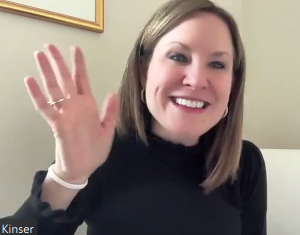
He was in 9th grade. Yet he could not read.
“Adrian, what happened?” she asked. “I wasn’t taught how to read, and my mom grew up in another country where they didn’t go to school,” he told her.
“They kept pushing him along,” Kinser says. “He would watch the History Channel, the National Geographic Channel because he wanted to learn.”
She connected Adrian with a phonics teacher and later left to teach in Japan for a couple of years. One day, she received a message from Adrian. The significance was that he was emailing her. Adrian could now write. He later went to college.
This anecdote is directly on point if you’re trying to understand Kinser and what motivates her. The Milwaukee charter school advocate, who is trying to unseat incumbent state school superintendent Jill Underly in the Feb. 18 primary, is focused primarily on helping more kids read, write, and do math. Yes, the basics. She sees the job through that viewfinder, in sharp contrast to Underly’s liberal partisan crusades and alleged incompetence.
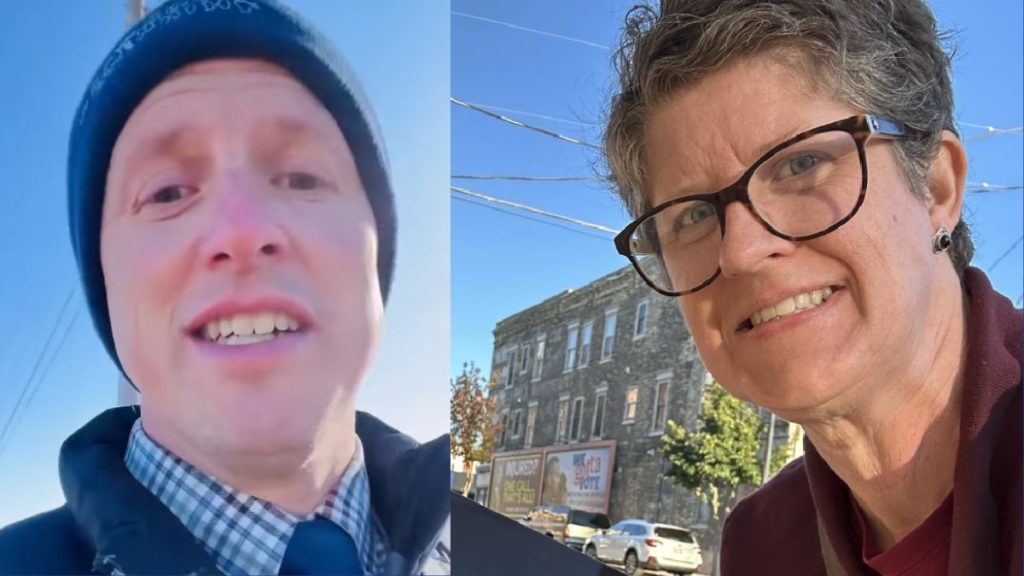
Kinser, a former teacher, principal, charter school regional CEO, and now educational consultant, remains profoundly disturbed by kids who can’t read. In fact, it’s the reason she jumped into the race with no apparent political base and not even a semblance of a campaign team. It’s no easy thing to take on entrenched Democratic interests, especially in the education world, and especially if you used to be one of them (maybe still are?), but have split with the party on a key issue (school choice).
There was already another candidate in the race, a superintendent and failed (twice) Democratic Assembly candidate named Jeff Wright, but he was competing with Underly for the scraps of her far-left base.
There’s also the matter of Underly’s fellow Democrat Gov. Tony Evers subtly throwing the incumbent repeatedly under the bus in public statements and insisting he absolutely will not endorse her. He hasn’t endorsed Wright either. The WEAC PAC has, but Underly’s got the Democratic Party, which means Democrats are battling ferociously for the pieces of their own pie.
The tough-to-label Kinser’s sudden entrance into the broken field has presented people who care about educational reform and who want DPI to get out of the business of pronoun advocacy and indoctrination with a real chance to win it. If Underly and Wright divide the far-left vote, the thinking goes, Kinser could slip through. Anything can happen in a three-way primary, of course. The turnout will be very low. The top two winners square off in April.
But Brittany Kinser needs conservatives (and moderates) to do it. And that’s not as clear-cut as it might seem.
‘Everyone Should Be Angry’
Why did Kinser decide to run?
Despite the memes floating around social media that laughably paint Republican GOP Chairman Brian Schimming as some DPI race svengali, Kinser insists that she jumped into the race on her own because of a disturbing conversation with a higher-up in Underly’s office.
In truth, many top Republicans (outside of school choice advocates) are too focused like laser beams on the state Supreme Court election to get Svengali-like on DPI. Their main concern about the DPI race is how it will affect turnout for former AG Brad Schimel. A lot of conservatives don’t even think that DPI should continue to exist. Still, now that she’s in, many conservatives are voicing interest in Kinser’s candidacy. The other two offer them nothing.
The critical moment came when Kinser reached out to a man in Underly’s office, whom she won’t name, to express grave concern about a national report card data point showing appallingly severe gaps in black achievement rates, especially in reading. Now a consultant, she was working on a tutoring program to help students read.
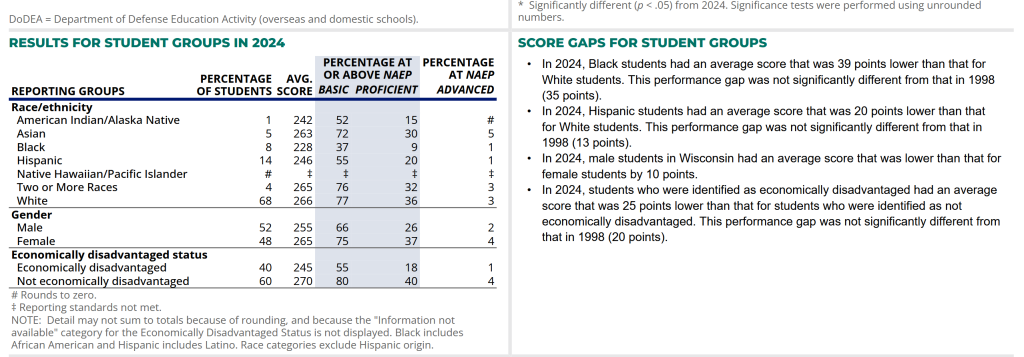
“It pissed me off,” Kinser says.
What was Underly’s response? In the wake of the bad report card, “Jill Underly lowers the standards. I was really mad.” Even Evers has been critical of this. And that’s when Brittany Kinser called the DPI official.
“Is this right? Did you lower the standards?” she says she told him. “This isn’t what is good for kids. The kids will still know they can’t read. Their employer will know and colleges will know. It might make adults feel good in the moment… Why did you do this?”
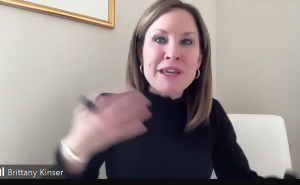
He said, “Oh, we had 80 experts come together,” and she asked, “Who are they?”
“He wouldn’t tell me. That’s when I found out they signed a non-disclosure,” Kinser says. She says that the man tried to make excuses about Wisconsin not being aligned with the nation’s report card system, which she disagrees with. She described him as “someone at the top.” Kinser says she was then told she was “too angry” by “someone at DPI” whom she won’t name, either.
“I said, ‘Everyone should be angry. This is not okay…’ I went for a run… As I was running, it popped into my head to run for DPI…I have never run for office…I started asking people, ‘What do you think?’ People were like, ‘You’re crazy; you’re going to go up against the Democrat Party. They’re just going to attack you. Can you actually get a campaign team?… You’re going to have to raise a million dollars.’”
At first she “couldn’t find anybody to be on my campaign team” because “there’s no independents.” Then a school leader called her and said that if she didn’t run, “Who’s going to be the voice of our kids?” Her sister told her their deceased dad “would want you to do this.” And so she did.
The caution-slingers forgot to factor in the aggressive albeit waning liberal corporate media machine in this state, which often functions as a conveyor belt for Democratic oppo research. Witness the “hit piece” (Kinser’s words) against her for no longer having a teacher’s license. This seems like the most inconsequential of low blows, considering you don’t need one to run DPI, she’s run an entire regional school network and worked as both a teacher and principal. She used to have an administrator’s license in Wisconsin.
The typical liberal mantra of “he/she is a far-right extremist so the sky is going to fall in and old ladies and puppies will die! Plus, they’re Hitler!” doesn’t fit at all with Kinser. So they’re casting around for something… anything.
Yet a campaign team quickly coalesced around Kinser once she took the plunge, and some of that has come from Republican circles and school choice advocates who were craving a candidate who was not Jill Underly or the once-Obama endorsed (for state Assembly) extremely liberal Jeff Wright. Neither appears to be trying to reach across the aisle at all.
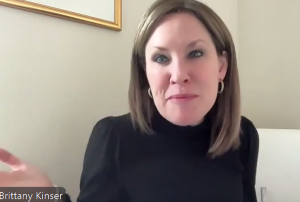
Some county GOP parties helped get the word out on Kinser’s candidacy, and former Republican state Rep. Amy Loudenbeck is running her campaign (she knew her through school choice networks).
Yet Kinser ventured haltingly into Conservative World, even turning down an interview on the largest conservative talk radio station in the state at first, because she wasn’t ready to do it and didn’t have nomination signatures gathered yet. Once she got them, she’s said a lot of things that conservatives (and independents and even some Democrats) would like, mostly about getting schools back to the basics and improving best practices and standards.
She’s taken a few controversial stances, saying at a forum that she supports keeping Act 10. Wright opposed it, and Underly skipped the forum altogether.
Kinser has gathered even more steam as the weeks passed and recently posted a whopping $301,000 fundraising haul for the pre-primary period. Underly only raised $81,773, and Wright hauled in just under $35,000. Kinser’s donors include conservative heavyweights (Dick and Liz Uihlein and Diane Hendricks among them), and people involved in the school choice movement.
It just might be the best chance conservatives have to take back the DPI seat (a position that propelled Tony Evers into the governor’s mansion) in decades. Maybe ever.
But this is where it gets really interesting.
Although the seat is technically nonpartisan, Brittany Kinser is not a Republican. She won’t even say she’s a conservative. Neither are the other two, though, and they’re certainly to the left of her. Maybe by a lot. Whether that matters is up to the voters. After all, the famous quote oft attributed to Ronald Reagan goes, “The person who agrees with you 80 percent of the time is a friend and an ally – not a 20 percent traitor..”
Unraveling Her Political Loyalties
Is Brittany Kinser a Democrat? And why the heck did she donate to the campaign of Democratic Sen. Tammy Baldwin in August? Not to mention all of the donations she made to Biden-Bernie-Hillary. Yes. Biden-Bernie-Hillary. (She did donate to former Republican legislator Dale Kooyenga, who is now the CEO of the Metropolitan Milwaukee Association of Commerce, but that seems like a one-off, although she supported Deb Kerr, the last more moderate candidate to seek the DPI post.)
In 2008, Kinser volunteered for Obama but “grew disenchanted,” an ABC7 Chicago article noted. In 2011, she attended a birthday gala for him, saying, “He hasn’t been as motivating as in the past. Today was awesome though. He was very energized. It was like (the) Obama I knew.”
Fast forward to 2024-25, and there’s been a political earthquake. It’s the year of disenfranchised Democrats casting around for another home. Could she be the Tulsi Gabbard of education, the RFK Jr. of DPI?
It’s a big ask to get conservatives to vote for a recent Tammy Baldwin donor (in August!) they’ve never heard of before, even if they’re being assured the other two are certainly, definitely, unquestionably worse because only one candidate (Kinser) supports school choice.
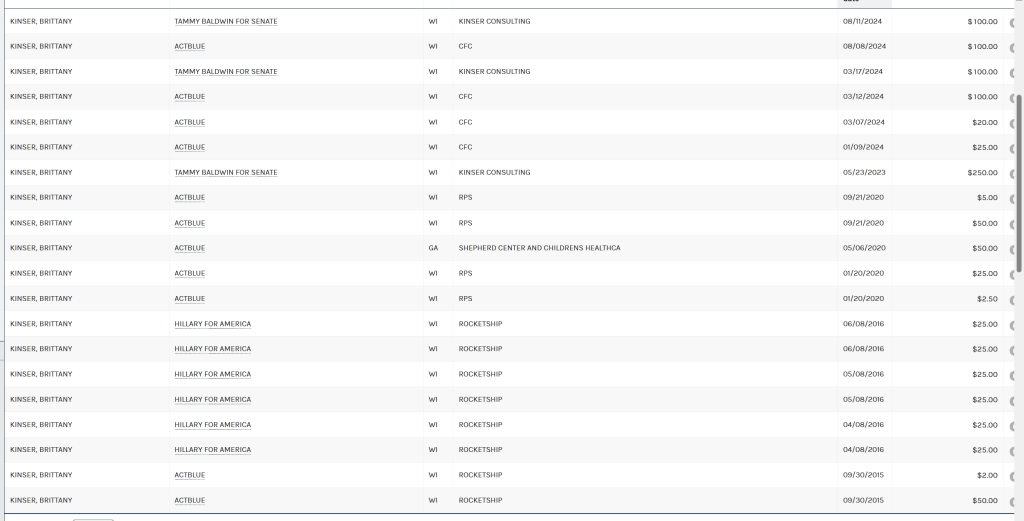
Kinser ventures into Twister territory when asked about political labeling. Wispolitics says she called herself a “Blue Dog Democrat” just last fall. She told CBS 58 she didn’t like labels, “pushing back on the suggestion she’s a moderate or centrist option.” She told WISN 1130’s Ben Yount in late January, “I know I’m on the record for calling myself a Blue Dog Democrat. That was when I thought I wasn’t running. I am able to work across the aisle.”
She is sort of all over the place when asked this question in Wisconsin Right Now’s interview as well.
“I don’t want to hide that I have been a Democrat in the past. I don’t want to lie to you or anyone. I voted for Republicans too especially as I’ve gotten into education, right? I am all about, in Louisiana they call it education freedom. Families being able to choose the school that is the best for their kids is so important to me. I have voted for both.”
“I’m not trying to say I’m a conservative, I have aligned with conservative people,” she added. “I’ve been meeting with conservatives. Their values are very similar. To me, it’s common sense. These are my common sense values. If they’re aligning with conservatives, then they’re aligning with conservatives. I would hope, though, that they’re aligning with everyone. Shouldn’t we want kids to learn? Shouldn’t we all want common sense ideas when it comes to education? I’m not trying to pull the wool over your eyes.”
Asked point blank if she is a Gabbard type or a moderate Democrat or someone who is independent now, or something else? She says: “I have been struggling with that to be honest. Oh my God, everyone’s trying to put me in a box, and I haven’t figured it out.”
Is she an independent? Where would she put herself? WRN tries again.
“I feel I am an issues-based person. When I think about education, the Democratic Party not supporting families having choices does not align… there are Democrats who support school choice. Republicans, independents. There are many people that support school choice because they want choices for their kids.” So many families “feel their school” is not “meeting the needs of their kids.” But she says most people are choosing traditional public schools, which is also “great.”
There is indeed a long history of Democrats who split with their party on the school choice issue (Annette Polly Williams, Jason Fields), but it’s not clear where Kinser comes down exactly outside of it.
She explains the Baldwin donation; she went to Baldwin’s event (in the height of her battle against conservative businessman Eric Hovde) because she was hoping to interest Baldwin in charter schools and a reading program she’s involved in, and Baldwin was nice to her face and acted interested, but then her staff blew Kinser off when she followed up. But Kinser also donated to Baldwin several other times in the last few years.
“I went hoping she would be open to meeting with families that send their kids to public charter schools, schools that accept scholarships,” she said. “…I went to talk to her about the program I was doing. Has she seen the nation’s report card?”
“She (Baldwin) personally was” receptive “but then her staff was like, ‘No.'”
Asked about those other Democratic donations, she says she debated education reform with Bernie supporters.
“At the time I was donating, I also got in an argument with Bernie people about this.” She said that she told them accountability for charter schools is very high. She told them to “stop attacking charter schools; it’s not okay.” People “talk about schools and vouchers like there’s not people behind that. You’re telling 50,000 families in Milwaukee you want to take their school away, mostly black and brown families who are living in low socio-economic neighborhoods.”
Kinser thinks people of all parties should be able to unite on the core issues that she is extremely clear on, namely getting kids to read and write.
She thinks the incumbent, Democrat Jill Underly, has used DPI inappropriately as a “political pulpit,” which Kinser insists she won’t do. She doesn’t think Underly was honest with voters about the state of Milwaukee Public Schools’ severe fiscal problems before a massive referendum last April, and she thinks the incumbent was dead wrong to water down school testing scores.
“Why didn’t she (Underly) come out and show us (MPS’s problems) before the referendum?” she asks. “I think it was dishonest. Lowering the standards too.”
Although it’s not 100 percent clear where Kinser is politically, she pledges to not be political.
She gets misty-eyed again talking about an “old man” who was standing in a Milwaukee tax line and who told her, “My taxes went up so much I don’t know if I can afford a house,” with tears in his eyes.
“DPI should be helping. We would have an office within Milwaukee so we are there helping,” she says, advocating for reading coaches in MPS schools.
How does she differ from Wright?
“I’m not a bureaucrat,” she says. “I’m not part of the establishment. I’m a school choice candidate. I’ve never run for office. I’m not part of the status quo.” Wright has run for office as a Democrat before, she notes, and “failed.”
Kinser has worked before across the aisle (on closing school funding gaps for charter schools).
There’s a charm to her lack of political savvy or slickness; she will lean forward and level with you, endearingly candid; she seems like just an educator who’s finally had enough, and maybe a fresh perspective is a good thing. Who wants a polished politician these days anyway? Brittany Kinser is not that. She is disarmingly not that; for example, asked if she would have done anything differently during COVID if she ran DPI then, she acknowledges that she shouldn’t have kept her charter schools closed for so long.
“I will be totally transparent. I kept us out way too long. I will own that,” she says.
Yet her efforts to make sure kids out of school still succeeded were impressive.
“We went and door knocked and found every kid. We went to help. We have to help families. We would track every day how kids were doing,” she said. “It still wasn’t as good (as being in person),” she says. “I wish we had been one of the schools to come back sooner.” But they sent every kid home with a Chromebook and made “sure every kid had Spectrum.” They sought donations to help kids whose families were late on payments.
“I am not a politician,” she stresses. “I get stuff done for kids.”
She has a relationship with both the “Republican legislature and Gov. Evers’ office.” She stresses, “I will work across the aisle. I will not use this as a political pulpit. I will be focused on kids and transparency.”
In the age of Trump, it seems a bit pre-2016 to cloak one’s views in vagueness. This is the age of authenticity and gone are the days when conservatives have to hide their views to win elections. Trump blew that out of the water; he just says it like it is. He’s made it acceptable to be vocally conservative again.
So have the parents’ rights moms. They’ve breathed fire into the education issue like never before. In fact, one of them, the feisty Ozaukee County activist with 100,000-plus X followers, Scarlett Johnson, flirted with the idea of running for DPI herself, although opinions vary about why she ultimately did not. A candidate Scarlett Johnson, though, would have been extremely clear on where she stands on all issues and would have unabashedly declared her conservatism. But that was not to be.
She has now endorsed Kinser.
“Many say Wisconsin is irreparably divided, but Brittany offers a unifying vision rooted in commonsense leadership,” Johnson wrote.
For the first time in a long time, in large part due to these Moms for Liberty moms and the anti-masking parents, it’s felt like school choice, albeit very important, was not the only message conservatives were bringing to voters on education. Go ask voters in suburban and rural districts, and many are more likely to talk about wanting better public schools. Heck, people move to some suburbs FOR the public schools. They just don’t want their kids indoctrinated, forced to wear masks, kept out of school forever because of a pandemic, or subjected to critical race theory. COVID also ignited them.
Yet the Kinser candidacy feels more similar to the era right before that.
One doesn’t get the sense that Kinser is doing this linguistic dance to earn votes; rather, she seems like a person whose political beliefs are undergoing a slow metamorphosis, an educator casting around for a political home and who is choosing kids over a party she feels isn’t serving them, and it’s tempting to argue that this might be exactly what a lot of people want.
Perhaps Brittany Kinser is closest to the actual job description; again, the state school superintendent is supposed to be a non-partisan position. Apparently someone forgot to tell that to Jill Underly; about 70% of the incumbent’s pre-primary fundraising came from the state Democratic Party.
Jarring Moments
Brittany Kinser’s lack of public/media experience also leads to some jarring moments.
Asked whether she supports the Wisconsin Parents Bill of Rights that went before the Legislature, Kinser surprisingly hesitates – not because she doesn’t agree with it per se, but because, she admits, “I didn’t read it. I’m sorry. I did not read that one.”
Asked what she thought of former President Joe Biden’s controversial Title IX changes (unraveled at warp speed by Trump), she’s not very up on those, either. “No, I didn’t do anything of that.” But did she support it? “Is that boys in the girls’ locker rooms?” she asks. Told he was changing discrimination codes, she says, “I didn’t pay attention to that to be honest.”
In her endorsement of Kinser, Scarlett Johnson wrote, “Girls Bathrooms and Female Sports: Brittany is committed to maintaining sex-separated bathrooms and protecting female athletes, ensuring dignity and safety in schools…As a conservative, I support Brittany Kinser because she brings an independent perspective that prioritizes education over politics.”
Does she support breaking up MPS? “No, I don’t think so. I don’t know enough about it. I don’t think so.”
To what degree does she want to expand school choice? Lift income caps entirely, universal school choice, what? How far would she go? “I am for school choice so if that is what families are wanting overwhelmingly, I’m for that.”
What about DEI? Has that gone too far under Underly? “I want all kids to feel welcome in class,” she says, but “DPI has no jurisdiction over that.” She calls it a “local control issue that families and districts and school boards should be working together on…you don’t want someone in Madison whether it’s me or anyone else telling you what to do all over the state.” She said it “might be different in Milwaukee versus what’s up in Rhinelander or Antigo.”
She wouldn’t be imposing a statewide indoctrination scheme, though. “No. Focus on reading, writing, and math.”
Those are big issues. Correction – they are very big issues.
Yet when asked about some aspects of the Parents Bill of Rights, Kinser is on board. For example, she supports more curriculum transparency. “Yes, we would show, this is the curriculum. Why not be transparent?”
And how about the hot-button issue of boys playing in girls’ sports? She confirms that she is firmly against that.
“I was an athlete. No,” she says.
What about pronouns in schools? Should the school have to tell the parents? “Yes, I think it’s really important for the schools to be working with parents. 100%.”
There’s likely zero chance Underly or Wright would agree with that sort of thing. That means that yes, from a conservative or just pro-kid perspective, they’re worse. But it begs the question of why conservatives couldn’t get a fire-breathing parents’ rights advocate to run, a conservative superintendent, or just a candidate who didn’t donate to Hillary Clinton. Is that so much to ask?
Wright has not agreed to an interview request. Underly’s positions are very well known.
Kinser sidesteps a question of what she thinks about Trump and, when asked who she voted for in the 2024 presidential election, she declines to answer.
The president is “trying to change things quickly,” she says, and that “scares people.” But some of those people’s fears are based on “misconceptions,” such as concerns about imminent loss of funding. “I think he’s going in like a business leader, ‘We’re going to fix things.'”
Asked whether she thinks the U.S. Department of Education should be eliminated, she said the department was also being used as a “political pulpit.” But she said as long as the money for grants still “goes into the states for us to use, it’s fine.”
A Problem Solver
Kinser is far more comfortable answering education-related questions.
Asked about the top issues facing rural schools, she names the cost of transportation and recruiting teachers. She is open to alternative licensing that takes into account other richness of life experience.
“Is this producing great results for kids? Are they reading? That’s what we should care about,” she says.
She believes that the school funding formulas need changing, and she’s worked across the aisle on such issues already. “Fair funding – I want to be a leader on that. I want to be a leader for those rural areas. The funding formula is very, very complex.”
Kinser has years of education credentials. She was a special education teacher. A science teacher. Eight years in Chicago Public Schools, according to her LinkedIn page. She has a master’s degree in designing science curriculum. She started a robotics team in Chicago that was “one of the top 20 robotics teams in the world, mostly black and brown kids living in poverty.” In fact, that’s how she was “introduced to Milwaukee.” They competed there. Then she came to this city and started running Rocketship charter schools.
She later became the CEO of a venture called City Forward Collective. She opened a math and science academy in Chicago. She started a tutoring program that showed dramatic results in helping kids read.
“Opening up a school from zero and getting 300 families and listening to them and hearing from them,” she says when asked what she’s proudest of.
For the first time since COVID, kids are “growing” under the tutoring program she champions. She says she asked MPS if they would implement the program but only charter schools were willing to do it.
She has worked hard to fix the “huge gap in funding” that penalizes charter schools.
“When you talk to parents, they didn’t realize their kids were getting so few dollars.” Closing the funding gap means schools “don’t have to fundraise as much as they can focus on instruction.”
She says she will “work with everyone for the best interest of kids” and will “100 percent bring best practices into Wisconsin” with a focus on improving reading and writing scores.
What is the #1 role of DPI? “To restore high standards,” she says, bringing the conversation full circle.
“I will not use this role as a political pulpit,” Kinser insists again.
“I get things done for kids. At all times, I will be thinking about kids.”
Table of Contents


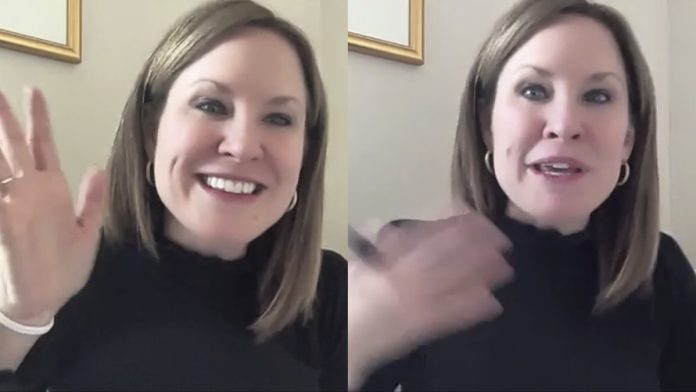










![WATCH: Elon Musk Town Hall Rally in Green Bay [FULL Video]](https://www.wisconsinrightnow.com/wp-content/uploads/2022/04/Elon_Musk_3018710552-356x220.jpg)



![The Wisconsin DOJ’s ‘Unlawful’ Lawman [WRN Voices] josh kaul](https://www.wisconsinrightnow.com/wp-content/uploads/2025/03/MixCollage-29-Mar-2025-08-48-PM-2468-356x220.jpg)
















